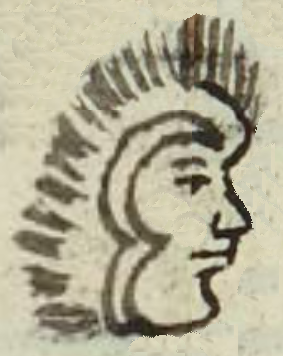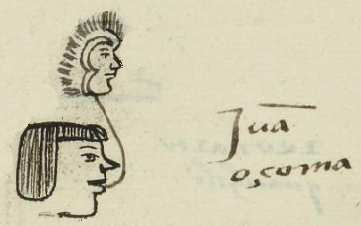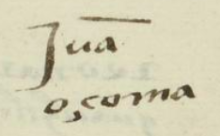Ozoma (MH622v)
This black and white drawing of the simplex glyph for the personal name Ozoma ("Monkey," attested here as a man's name), shows the head of a monkey in profile facing toward the viewer's right. Its hair stands up on end. Its visible eye is open, and it has a double-curving line along the edge of its face.
Stephanie Wood
The glyph for monkey very typically shows the hair (tzontli) on the top of its head standing up, and sometimes the hair is long and thick, and so very noticeable. Perhaps this portrayal of hair is meant to serve as a phonetic complement for the "zom" in the middle of the root ozoma, given that "tzon-" stands for hair.
The ozomatli is a day sign in the 260-day calendar called the tonalpohualli, so it was given as a name to babies born on its day. There was also a divine force or deity named Ozomatli, which, according to Desmond Morris (Monkey, 2013, 41), was "the companion spirit and servant of the god Xochipilli, the deity of music and dance. In paintings it is depicted dressed in malinalli herbs and with white, oval earrings with pointed ends." The wide-open eye of this particular version of ozomatli is also found in other manuscripts and may be, along with the hair, a diagnostic.
Typically, a calendrical name would not only have the day sign but also a companion number from 1 to 13. By 1560, it is not unusual to see such numbers dropping away, whether inadvertently or possibly suppressed in the colonial context where consulting the pre-contact divinatory calendar could upset the local clergy.
Stephanie Wood
1560
Jeff Haskett-Wood
monkeys, monos, calendarios, tonalpohualli, días, deidades, deities, divinities, divine forces, ozomatli, nombres de hombres

ozoma(tli), monkey, https://nahuatl.wired-humanities.org/content/ozomatli
Mono
Stephanie Wood
Matrícula de Huexotzinco, folio 622v, World Digital Library, https://www.loc.gov/resource/gdcwdl.wdl_15282/?sp=327&st=image.
This manuscript is hosted by the Library of Congress and the World Digital Library; used here with the Creative Commons, “Attribution-NonCommercial-ShareAlike 3.0 License” (CC-BY-NC-SAq 3.0).







